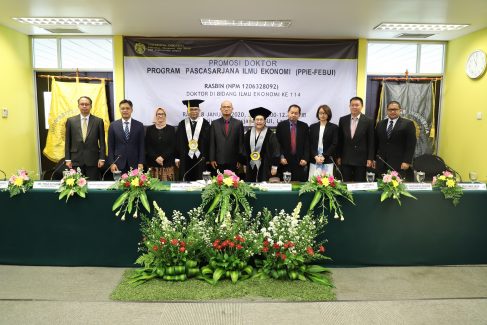Rasbin Studied Undervaluation of Effective Exchange Rates in Encouraging Manufacturing Exports
Nino Eka Putra ~ Humas FEB UI
DEPOK – Postgraduate Program in Economics, Faculty of Economics and Business, University of Indonesia held an open session of Rasbin Doctoral Promotion (1206328093) at the Postgraduate Auditorium, Postgraduate Building, Wednesday (01/08/2020).
The Doctoral Promotion Session was chaired by Prof. Susiyati B. Hirawan, Ph.D., with her supervisor, Prof. Mohamad Ikhsan, Ph.D. (Promoter), Dr. Beta Yulianita Gitaharie (Co-Promoter 1), and Yoga Affandi, Ph.D. (Co-Promoter 2). As the testing team, Dr. Arie Damayanti (Chief Examiner), Sugiharso Safuan, Ph.D., Muliadi Widjaja, Ph.D., Febrio Nathan Kacaribu, Ph.D., and Dr. Edi Prio Pambudi.
The dissertation raised by Promovendus, titled “Is Undervaluation Effective Exchange Rates in Encouraging Manufacturing Exports? The Case of Indonesia “. By using a balanced exchange rate estimation from the SCM (synthetic control method) approach, this study found that the real exchange rate in the 1987-2015 period experienced misalignment and most of it was undervalued. When Indonesia implements a managed floating II exchange rate system, the real exchange rate experiences an undervaluation of around 12.3 – 15.0 percent.

“However, when the implementation of the floating exchange rate system was controlled by the crawling band, Indonesia’s real exchange rate experienced an overvaluation of around 0.77 – 8.12 percent. Furthermore, when implementing the free floating exchange rate system, Indonesia’s real exchange rate undervaluated around 2.38 – 85.47 percent,” Rasbin said.
Using the AMG (augmented mean group) method, this study found that undervaluation of the real exchange rate and exchange rate changes at the level of level did not have a significant impact on aggregate manufacturing exports. “This means that undervaluation of the exchange rate and changes in the exchange rate at the level of the level can not significantly increase manufacturing exports,” he said.
This finding indicates that exchange rate manipulation policy is not a dominant factor in strengthening the competitiveness of manufactured industrial export products. Although the impact of exchange rate undervaluation and exchange rate changes on aggregate manufacturing exports is not significant, there are a number of manufacturing industries whose exports are affected by undervaluation of real exchange rates and changes in real exchange rates significantly.
Two manufacturing industries experienced a significant increase in exports due to exchange rate undervaluation while five other manufacturing industries experienced the opposite. “When the estimation uses the real exchange rate at the level level, there are two manufacturing industries which also experienced a significant increase in exports by depreciating the real exchange rate. Seven other mamufaktor industries experienced a decline in exports when the real exchange rate depreciated,” he added.
Following industry classifications based on factors intensities, the elasticity of manufacturing exports to undervaluation of the exchange rate and exchange rate changes for the capital-intensive industry are more elastic than the labor-intensive industry. “This indicates that exports from the capital-intensive manufacturing industry are more sensitive to the exchange rate, both exchange rate misalignment and exchange rate changes at the level of the level,” he concluded.
Thus, the Leadership Council of the open session of doctoral promotion decided, Rasbin (1206328093) was declared to graduate with the title of Satisfaction and succeeded in getting the 114th Doctoral degree in Economics. Congratulations to Dr. Rasbin! (Des)














